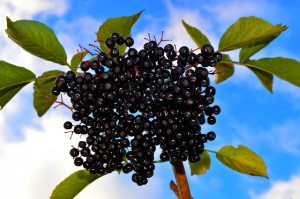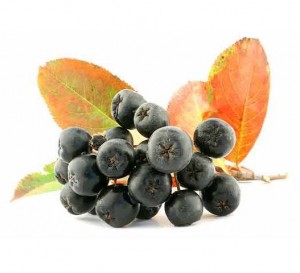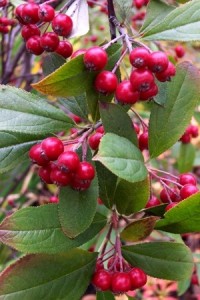Aronia – Super Food And Natural Medicine
Aronia is a fruit with a form that mostly resembles to the fruit of blueberries.
Among the people is also known as Siberian blueberry for two reasons.
The first is although she originates from North America, the most widespread is in Russia, and the second because it is very resistant to low temperatures.
Properties of this Amazing Fruit
It has amazing resistance to cold winters and can survive even at the temperature to -45 degrees Celsius.
This plant grows in the shape of the bush and if there is enough space can reach a height of about 2 meters.
Its fruit is edible and has a very healing effect and can be harvested even after two months after they mature.
North American Indians have been used this food, while the fruits were dried and grind and combined with meat.
Fresh fruit of aronia have been often used as a remedy for stomach upset (stomach and intestinal upsets), and the leaves and bark we used as a tea that prevented bleeding from the wound.
To the European continent is brought from the eastern part of North America.
Was first settled in Russia, Finland and Sweden.
As an ornamental shrub or fruit, aronia does not require special conditions for growth.
It can be planted without problems on a little fertile soil.
She is resistant to low temperatures and late spring frost so it thrives in cooler areas.
It does not require special care, except that it is necessary to allow the required humidity.
It grows in any soil, if not too rocky, swampy or too shallow.
Since it is resistant to salt, can be planted on roadside and serve as hedges.
But if you plant it on the fertile land, with a distance of 2 meters, the bushes can reach a height of 1.5 to 2.5 meters and be very fruitful.
Aronia does not need a spraying because it cannot suffer from diseases or lice.
Types of Aronia
There are three types of this magnificent fruit:
Purple Aronia (Aronia prunifolia)
Red Aronia (Aronia arbutifolia)
Nutrition Values
Black aronia fruits are extremely rich in vitamins since they contain vitamin C, A, E, B2, B6, B9 and very rare vitamin P.
From minerals contain calcium, potassium, iron, molybdenum, manganese, phosphorus and iodine.
In all aronia fruits there is a high concentration of antioxidants (tannins, biophenols, flavonoids, anthocyanins, catechins) and is considered that is bigger antioxidant than cranberries.
That’s why It is useful in the prevention against cancers, effectively purifies the body from harmful materials and even from heavy metals.
Additionally it contains rare fruit sugar called sorbitol.
Medical Properties
From the medicinal properties of these fruit most famous are those that stimulates circulation, purifies the blood, relieves headaches and migraines.
It also lowers blood pressure, favorably affects the stomach and intestines, prevents diarrhea, increases the immune system, prevents the development of viral and bacterial infections.
Special is highlighted her soothing effect on the stomach and liver because it purifies them and provides proper growth and work of these bodies.
Especially important is to say that aronia regulates the proper functioning and secretion of hormone on the thyroid gland, and regulates the work of the pancreas.
Therefore it may be useful in the treatment of diabetes because it lowers the sugar in the blood.
Chokeberry as someone names her also helps with wound healing, slows down aging of the skin and body, prevents the occurrence of wrinkles and protects against UV radiation.
It is commonly used as dried fruit or juice.
Aronia tea is recommended to be taken by young and old people because it will improve their blood picture.
Apart juice and tea from the fruit can be prepared delicious marmalades, compotes, fruit porridge and syrups.
From fruits also can be make fruit drinks, brandy, liqueur, vinegar and wine.
Therefore it is said that ARONIA IS FOOD AND MEDICINE!









